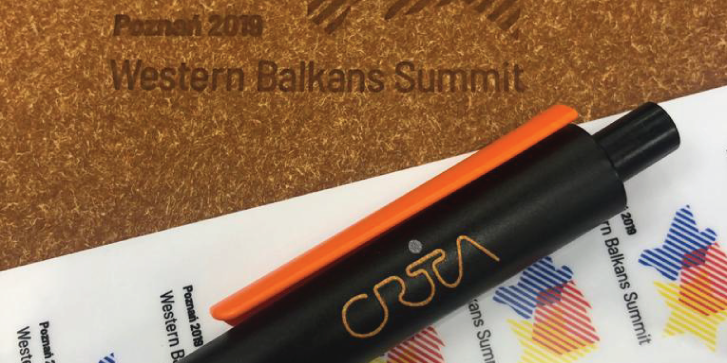On the state of democracy and the threats to regional cooperation with the ministers of foreign affairs of the countries of the Western Balkans and the European Union
 Photo by: CRTA
Photo by: CRTA
The meeting between six representatives of civil society organizations from the region and the ministers of foreign affairs of the Western Balkans and the European Union countries, was held between 3rd and 5th of July at the 2019 Western Balkans Summit in Poznan in the course of the Berlin Process.
The discussion topic were the key challenges the Western Balkans region is facing with. The meeting was moderated by Aleksandra Tomanić, Executive Director of the European Fund for the Balkans. Representatives of civil society – Jovana Marović (Politikon Network), Vukosava Crnjanski (CRTA), Adnan Huskić (Center for Electoral Studies), Gjergij Vurmo (Institute for Democracy and Mediation), Naim Raish (Balkans Policy Research Group) and Marko Trosanovski (Institute for Democracy Societas Civilis) – addressed crucial regional problems and challenges, as well as messages regarding the state of democracy, the rule of law, bilateral disputes, European integration, freedom of the media and freedom of speech, and future of the Berlin Process.
Vukosava Crnjanski warned that inflammatory rhetoric and weak democratic institutions are threat to the regional cooperation and stability. She called for a greater role of parliaments in the European integration process. You may access her complete speech below.
Dear ministers, dear colleagues from the civil society,
First I would like to remind us all that the European Union is first and foremost a peace project, that is grounded in values of democracy, solidarity and human rights.
Having this in mind, I would like to call the political elites in the region to show substantial commitment to this model we have strategically chosen to follow. This means to restrain from using the inflammatory rhetoric that continuously produces hate speech across the region, fuels populism and disinformation, and narrows the space for dialogue.
Another issue that I would like to address is the urgent need to restore parliaments as pivotal democratic institutions in the region. Parliaments need to be transformed from “voting machines” into genuine spaces for nurturing dialogue, overseeing the executive and deciding on laws based on facts and evidence. Parliaments should have a substantial voice in the European integration process, by taking a more proactive role in scrutiny over the progress and through active involvement in initiatives such as the Berlin process.
I would like to conclude with the following. If we fail to maintain sincere commitment in defending democratic values – hate speech, undemocratic performance of institutions and lack of citizen trust and engagement will continue to undermine regional cooperation, seriously threatening regional stability.
We have to show dedication to democracy and European Union as our key strategic priorities both through concrete actions and the official everyday narrative.








